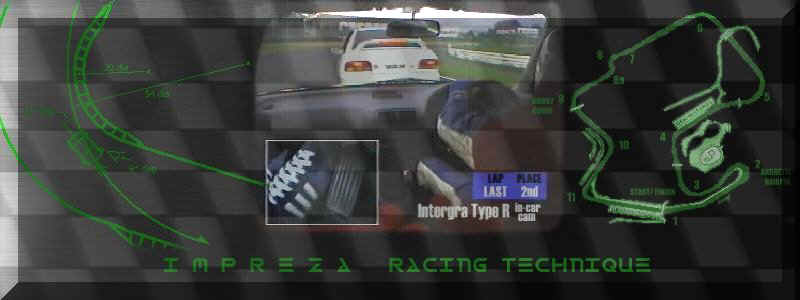|
|
|

Racing Terms and Definitions
| Apex: | The point were the car comes closest to the inside edge of the track |
| Blip: | A sudden tap of the throttle. Usually done to increase rpms during shifting. |
| Brake Point: | A reference point a driver would use to start applying brake before a turn |
| Brake Tuning: | Using both barking & turning ability of the car between the turn-in point & apex |
Breathing the Throttle: |
Slightly lifting pressure from full throttle or current throttle position |
| Camber: | used to describe wheel or road angle,(banking) relative to the horizon |
| Constant Radius Corner: | A corner that has a constant radius through the turn |
| Corner Entry: | the area between deceleration or braking the point begins and full throttle(apex) begins |
| Crab: | gradual movement from outside of the track approaching the corner. |
| Decreasing radius Corner: | a corner that has a smaller radius in the last half of the turn. |
| "Going Deep": | braking as late as possible before reaching a turn. |
| Dump Shifting: | skipping gears when downshifting. |
| Early Apex: | the point where the car reaches the inside most portion of the track. Can cause the car to go off the track, unless the driver pulls it back in on the second half of the turn |
| Exit Speed: | the speed you start with once you leave a turn. |
| Hair Pin Turn: | a corner that exceed 100 to 120 degrees. |
| Heel-Toe: | the process of blipping the throttle with the side of you foot or heal while pushing in the clutch and keeping constant pressure on the brake. 'using two feet on three pedals at the same time' |
| Increasing Radius Turn: | a turn were the radius of the first part of the turn is tighter than the second half. |
| Late Apex: | the point when the car reaches the inside most portion of the track past the ideal apex. Can cause the car not to use the full width of the track. |
| Lift: | slight reduction of the throttle |
| Line: | the optimum path that will produce the quickest time around the track |
| Load Transfer: | the change or shifting of weight on tire(s) to another caused by accelerating, braking, or turning the car. |
| Lock up: | when too much brake pressure is applied causing tire smoke, deceased braking traction and control |
| Loose: | a short term for understeer |
| Neutral Handling: | when a car at it's cornering limits has both front and rear tires achieving the same slip angle |
| Oversteer: | when a car at it's cornering limits, the rear tire's have a greater slip angle than the front causing the back end to slide out wider than the front portion of the car. |
| Pinching: | inputting addition steering towards the turning direction generally to make up for an early apex |
| Pitch: | the ride height chug of rear and front of the car caused by braking and acceleration. |
| Push: | a term used the describe understeer. As to were the rear tires are pushing the front tire in a strait line regardless of what direction the front tires are turned. |
| Reference point: | a visual reference or spot on or near the track used to cue the driver for an action such as braking ,turning, apex, accelerating, ect. |
| Roll: | the ride height change of the right and left side of the car caused by turning. |
| Skid Pad: | a large circular area , at least 200ft dia, used to test and practice controlling a car at it's cornering limits. |
| Slicks: | generally soft 'sticky' tires which have the greatest tire surface contact with the road surface. Achieving maximum road traction by having a smooth tire surface with no tread. |
| Slip angle: | the angle difference of the direction of travel of the tire and direction of the tires centerline direction. |
| Sweeper: | generally a turn that can be taken fast with minimal or no slow down. |
| Turn-In: | the point were you start to turn the steering wheel for a turn. |
| Turn-out: | the point were you start to turn the steering wheel back for exiting the turn. |
| Track-out: | the point where the car touches the outer most point on the track exiting a turn. |
| Threshold Braking: | Using all of the cars braking ability in a strait line to reduce speed for turning |
| Trail Braking: | using the braking abilities in coordination with the cars turning abilities |
| Tight: | term user to describe under steer |
| Throttle point point: | were the driver starts to apply power for acceleration |
| Understeer: | when a car at it's cornering limits, the front tire's have a greater slip angle than the back tires causing the car to travel straighter or wider even thought the driver is turning the steering wheel more. When the steering wheel is turned but the front tires slip the car still travels strait. |
| Yaw angle: | the angle difference of what direction the front of the car is pointing and were the direction of were car is actually traveling. |
|
|